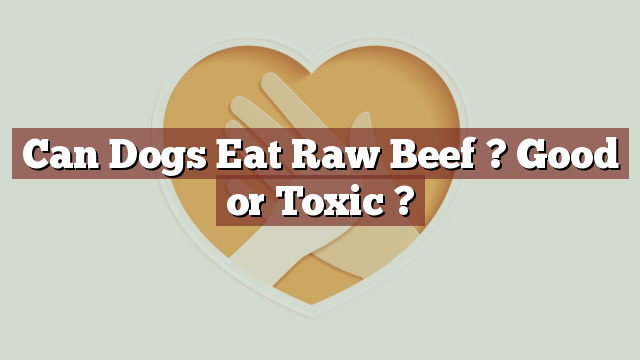Can Dogs Eat Raw Beef? Good or Toxic?
Knowing what foods are safe for our dogs is essential for their overall health and well-being. One such food that often comes into question is raw beef. In this article, we will examine the nutritional value of raw beef for dogs, explore the potential toxicity risks, discuss the potential benefits and risks of feeding dogs raw beef, and provide guidance on what to do if your dog consumes raw beef.
Nutritional Value of Raw Beef for Dogs: Protein, Vitamins, and Minerals
Raw beef is a rich source of protein, vitamins, and minerals that are vital for a dog’s health. Protein is essential for muscle growth and repair, as well as maintaining a healthy coat and skin. Beef also contains important vitamins such as B12, which supports a dog’s nervous system, and minerals like iron and zinc, which are important for overall immune function and energy production.
Is Raw Beef Safe for Dogs? Exploring the Potential Toxicity Risks
While raw beef can provide valuable nutrients, it is important to consider the potential risks associated with feeding dogs raw meat. Raw beef may contain harmful bacteria such as Salmonella or E. coli, which can cause food poisoning in dogs. Additionally, uncooked bones in raw beef can pose a choking hazard or lead to intestinal blockages if swallowed.
According to veterinary experts, dogs can eat raw beef, but caution must be exercised. The quality and hygiene of the meat are crucial. It is recommended to source raw beef from reputable suppliers to minimize the risk of bacterial contamination.
Potential Risks and Benefits of Feeding Dogs Raw Beef
Feeding dogs raw beef comes with both potential risks and benefits. On one hand, the high protein content and essential nutrients in raw beef can contribute to a dog’s overall health. Some dog owners claim that a raw food diet, including raw beef, can lead to improved digestion, healthier skin, and a shinier coat. However, it is important to note that these claims are largely anecdotal, and more scientific research is needed to substantiate these claims.
On the other hand, the potential risks of bacterial contamination and the hazards of uncooked bones should not be ignored. It is important to assess the individual dog’s health, age, and any pre-existing conditions before introducing raw beef into their diet.
What to Do If Your Dog Eats Raw Beef: Symptoms and Action Steps
If your dog consumes raw beef, it is essential to monitor them for any signs of distress or illness. Common symptoms of food poisoning in dogs may include vomiting, diarrhea, abdominal pain, lethargy, and loss of appetite. If you notice any of these symptoms, it is recommended to consult with a veterinarian immediately.
To prevent any potential risks, store raw beef separately from other foods, handle it with clean utensils, and ensure proper food hygiene practices. If you decide to feed your dog raw beef, it is advisable to consult with a veterinarian or a canine nutritionist to ensure a balanced diet and minimize any potential health hazards.
Conclusion: Weighing the Risks and Benefits of Raw Beef in a Dog’s Diet
In conclusion, dogs can eat raw beef, as it provides valuable nutrients such as protein, vitamins, and minerals. However, it is important to exercise caution due to the potential risks of bacterial contamination and the hazards of uncooked bones. The decision to feed dogs raw beef should be made after considering the individual dog’s health, consulting with a veterinarian, and following proper food hygiene practices. Ultimately, it is important to weigh the potential benefits against the potential risks when considering raw beef as a part of a dog’s diet.
Thank you for investing your time in exploring [page_title] on Can-Eat.org. Our goal is to provide readers like you with thorough and reliable information about various dietary topics. Each article, including [page_title], stems from diligent research and a passion for understanding the nuances of our food choices. We believe that knowledge is a vital step towards making informed and healthy decisions. However, while "[page_title]" sheds light on its specific topic, it's crucial to remember that everyone's body reacts differently to foods and dietary changes. What might be beneficial for one person could have different effects on another. Before you consider integrating suggestions or insights from "[page_title]" into your diet, it's always wise to consult with a nutritionist or healthcare professional. Their specialized knowledge ensures that you're making choices best suited to your individual health needs. As you navigate [page_title], be mindful of potential allergies, intolerances, or unique dietary requirements you may have. No singular article can capture the vast diversity of human health, and individualized guidance is invaluable. The content provided in [page_title] serves as a general guide. It is not, by any means, a substitute for personalized medical or nutritional advice. Your health should always be the top priority, and professional guidance is the best path forward. In your journey towards a balanced and nutritious lifestyle, we hope that [page_title] serves as a helpful stepping stone. Remember, informed decisions lead to healthier outcomes. Thank you for trusting Can-Eat.org. Continue exploring, learning, and prioritizing your health. Cheers to a well-informed and healthier future!

